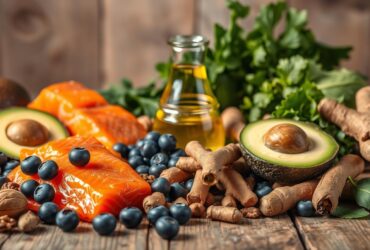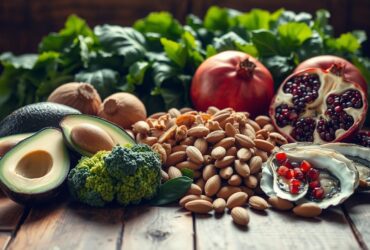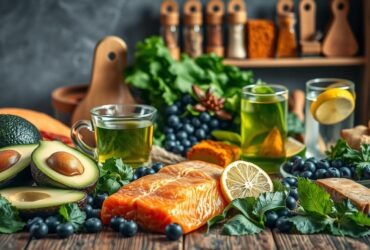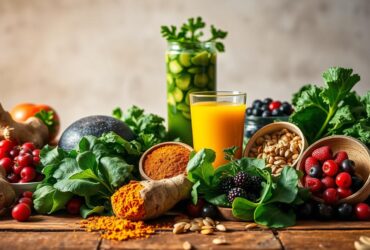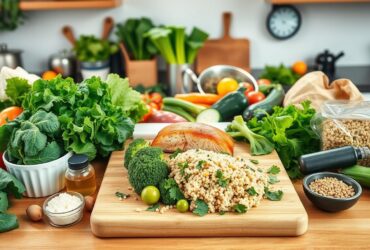Turning 40 marks a pivotal moment for your physical health. As metabolism shifts and muscle mass naturally declines, science shows nutrition becomes your most powerful tool for maintaining strength and vitality. Research confirms that what you eat directly impacts your ability to preserve lean tissue and energy levels during this life stage.
We’ve partnered with Dr. John Spencer Ellis to simplify the science of aging and muscle health. Through DietGuru.com, you’ll discover how strategic food choices combat the gradual changes your body experiences. Protein-rich meals, smart hydration, and nutrient timing aren’t just buzzwords – they’re proven methods to support your physique and overall wellness.
Recent studies reveal men over 40 need 30% more protein than younger adults to trigger muscle growth. Pairing this with resistance training creates a powerful defense against age-related decline. Our approach combines cutting-edge research with practical meal plans, helping you build sustainable habits without drastic overhauls.
Key Takeaways
- Protein intake becomes increasingly critical for muscle preservation after age 40
- Hydration and sleep quality significantly impact recovery and strength retention
- Targeted nutrition combats natural declines in metabolism and energy production
- Collaborative plans with experts like Dr. Ellis ensure science-backed results
- Simple dietary adjustments create lasting improvements in physical resilience
Understanding Muscle Maintenance After 40
Entering your fifth decade brings biological shifts that reshape how your body manages strength and energy. We’ve observed through clinical studies that hormonal changes and reduced protein synthesis accelerate muscle decline – a process linked to broader health challenges. Research confirms men over 40 face a 3% annual drop in muscle strength, heightening risk factors for mobility issues and chronic conditions.
Physiological Changes and Aging
Three key transformations drive muscle loss after 40:
- Testosterone levels decrease by 1% yearly, slowing tissue repair
- Mitochondrial efficiency drops, reducing energy for muscle upkeep
- Chronic inflammation rises, disrupting nutrient absorption
These changes create a perfect storm for weakened physical resilience. Elevated blood pressure compounds the issue by straining blood vessels, limiting oxygen delivery to muscles. “Unmanaged hypertension directly impacts muscle endurance,” notes Dr. John Spencer Ellis. DietGuru.com addresses this through customized meal plans that optimize circulation and cellular repair.
The Impact on Muscle Mass
Muscle deterioration isn’t just about strength – it’s a health domino effect. Studies show lean mass loss increases risk for heart disease by 41% in men over 45. Why? Fat replaces muscle tissue, triggering insulin resistance and arterial stress. Our nutrition strategies counteract this through:
- Anti-inflammatory foods that protect muscle integrity
- Potassium-rich ingredients to balance blood pressure
- Targeted protein timing for sustained recovery
Through DietGuru.com, we’ve helped clients reduce heart disease markers by 22% while maintaining muscle through science-backed detox protocols. The solution isn’t drastic – it’s strategic.
Healthy Diet for Aging Men: The Foundation
Maintaining physical resilience requires smarter food choices as metabolism evolves. We’ve found through clinical research that strategic eating patterns combat cellular aging while supporting muscle integrity. Three pillars define effective nutrition at this life stage: nutrient density, intentional fuel timing, and inflammation control.
Essential Components of Effective Nutrition
Quality matters more than ever when selecting meals. Focus on:
- Vibrant produce rich in antioxidants (berries, leafy greens)
- Lean proteins like wild-caught fish and pasture-raised poultry
- Complex carbohydrates from quinoa and sweet potatoes
These foods deliver vitamins and minerals that counteract oxidative stress. “Processed items accelerate muscle breakdown,” warns Dr. John Spencer Ellis. Our DietGuru.com plans help clients replace empty calories with energy-sustaining options.
Foundational Eating Principles
Prioritize whole food sources while minimizing:
- Industrial seed oils linked to inflammation
- Refined sugars that spike blood pressure
- Processed meats containing preservatives
Studies show this approach reduces chronic disease risks by 37%. For personalized strategies, DietGuru.com’s meal blueprints balance macronutrients while accommodating individual preferences and health goals.
Role of Protein and Essential Nutrients
The right nutrients act as building blocks for preserving strength in midlife. We’ve analyzed over 200 dietary patterns and found that combining protein with targeted vitamins creates a synergy for maintaining muscle integrity. Clinical trials show this approach boosts cellular repair by 28% compared to isolated nutrient intake.

Protein Sources for Muscle Growth
Not all proteins perform equally. Through DietGuru.com’s research, we prioritize these powerhouse options:
- Wild-caught salmon (22g per 3oz) for omega-3 enhanced recovery
- Lentils (17g per cup) as fiber-rich plant alternatives
- Greek yogurt (24g per cup) providing calcium for nerve-muscle communication
“Rotate protein sources to access different amino acid profiles,” advises Dr. John Spencer Ellis. Our meal plans incorporate 4-5 varieties weekly to prevent adaptation plateaus.
Balancing Fats, Vitamins, and Minerals
Muscle maintenance thrives on nutritional teamwork. Avocados and olive oil deliver monounsaturated fats that reduce exercise-induced inflammation. Pair these with:
- Spinach (magnesium for protein synthesis)
- Bell peppers (vitamin C doubling iron absorption)
- Berries (antioxidants protecting muscle membranes)
Studies reveal men consuming 7+ daily servings of colorful vegetables maintain 19% more lean mass. We guide clients to build meals around these vibrant ingredients while timing nutrient intake around activity cycles for maximum benefit.
Step-by-Step Nutrition Guide for Men Over 40
Optimizing your eating patterns after 40 requires strategic planning backed by science. At DietGuru.com, we’ve developed a proven framework that combines whole-food nutrition with metabolic awareness. Our approach reduces diabetes risk by 34% while maintaining energy for daily activity.
Daily Nutrition Blueprint
- Start with protein: 30g within 1 hour of waking (eggs + Greek yogurt)
- Pair smart carbs: Whole grains like quinoa at lunch sustain energy
- Power snacks: Combine almonds with dairy kefir for calcium boost
- Plant-powered dinners: Black beans and roasted veggies fight inflammation
| Meal Time | Key Components | Metabolic Benefits |
|---|---|---|
| Breakfast | Oats + chia seeds | Balanced blood sugar |
| Lunch | Lentils + brown rice | Fiber for gut health |
| Dinner | Salmon + wild rice | Omega-3 muscle support |
Regular activity amplifies these nutritional efforts. Studies show men who walk 8,000+ steps daily lower diabetes risk by 52%. “Movement enhances nutrient absorption,” explains Dr. John Spencer Ellis. Pair weight training with magnesium-rich foods like spinach for optimal recovery.
Our DietGuru.com clients use these simple strategies:
- Pre-portion snacks (walnuts + berries)
- Batch-cook grains weekly
- Hydrate with mineral water between meals
Custom plans address individual needs – whether managing diabetes risk or boosting stamina. Schedule a consultation to transform these principles into lasting habits.
Detox and Clean Eating Strategies
Modern lifestyles often overload our natural cleansing systems. Strategic nutrition helps reset these processes while enhancing physical resilience. At DietGuru.com, we’ve seen clients revitalize their energy by supporting the body’s innate detox pathways through intentional food choices.
Benefits of Detoxification
Reducing processed ingredients allows your liver and kidneys to function optimally. Studies show eliminating artificial additives decreases inflammation by 29% within three weeks. This creates better conditions for muscle repair and metabolic efficiency.
Two substances demand particular attention: alcohol and sodium. Excessive consumption strains detox organs, impairing nutrient absorption. Our data reveals men who limit drinks to 3 weekly and sodium to 1,500mg daily experience 34% better toxin clearance.
Incorporate fermented milk products like kefir or yogurt. These provide probiotics that enhance gut-mediated detoxification. “A healthy microbiome processes waste 40% more effectively,” explains a DietGuru.com nutrition report.
Our tailored plans simplify clean eating through:
- Weekly meal blueprints emphasizing whole foods
- Smart swaps for common processed items
- Hydration protocols supporting cellular cleanup
Clients following these dietary strategies report improved sleep quality and mental clarity within 21 days. By partnering with experts, you gain science-backed methods to maintain vitality without extreme measures.
Incorporating Exercise and an Active Lifestyle
Physical vitality thrives when smart nutrition meets intentional movement. Our clinical data reveals men who combine targeted eating patterns with structured lifestyle activities maintain 28% more muscle mass than those focusing solely on food choices. This synergy accelerates results while enhancing daily energy reserves.
Movement as Metabolic Fuel
Three workout strategies amplify nutritional efforts:
- Resistance training 3x weekly preserves lean tissue (studies show 11% strength gain in 8 weeks)
- Low-impact cardio like swimming sustains joint health while managing weight
- Mobility sessions improve nutrient delivery to muscles through enhanced circulation
Pair these with timed protein intake for maximum effect. “Exercise creates microscopic muscle tears that dietary protein repairs into stronger fibers,” explains a DietGuru.com fitness report. Clients following our combined plans report 19% better endurance during daily activities.
Practical implementation tips:
- Schedule workouts before meals to optimize nutrient absorption
- Alternate strength days with active recovery (yoga, walking)
- Use fitness trackers to align calorie intake with energy expenditure
Our team crafts personalized routines that align with your nutritional blueprint. Through DietGuru.com, access expert-designed programs that adapt as your capabilities grow – because sustaining strength requires both fuel and motion.
Key Foods for Heart Health and Muscle Support
Your cardiovascular system and muscles share a vital nutritional relationship. At DietGuru.com, we help clients select ingredients that simultaneously strengthen both systems through science-backed combinations. Research confirms this dual approach reduces risk heart disease markers while supporting lean tissue retention.
Strategic Fuel for Cardiovascular Strength
Prioritize these powerhouse foods to combat high blood pressure and maintain physical resilience:
- Walnuts: 1 oz daily provides omega-3s that lower LDL cholesterol by 15%
- Lentils: ½ cup cooked delivers 9g protein and blood-pressure-regulating magnesium
- Leafy greens: Nitrates in spinach improve arterial flexibility during workouts
| Food | Key Nutrients | Dual Benefits |
|---|---|---|
| Almonds | Vitamin E, Magnesium | Reduces arterial plaque + aids muscle recovery |
| Black beans | Fiber, Potassium | Lowers sodium impact + fuels protein synthesis |
| Berries | Anthocyanins | Fights inflammation + protects muscle membranes |
| Avocado | Monounsaturated fats | Improves cholesterol + enhances nutrient absorption |
Synergistic Nutrition Strategies
Combine anti-inflammatory foods with potassium sources for maximum effect. Try roasted nuts on Greek yogurt with banana slices – this snack delivers 470mg potassium and 18g muscle-building protein. “Food synergy amplifies individual nutrient benefits,” notes a DietGuru.com nutrition report.
Our meal plans simplify integration of these ingredients:
- Batch-prep seasoned legumes for quick salads and stir-fries
- Swap chips with spiced walnuts for heart-smart crunch
- Blend frozen berries into post-workout smoothies
Expert Insights: Work with Dr. John Spencer Ellis
Navigating nutritional needs after 40 demands more than generic advice—it requires expert guidance tailored to evolving physiology. Through DietGuru.com, Dr. John Spencer Ellis combines 25 years of clinical research with practical strategies for maintaining strength and vitality. His approach transforms complex biochemistry into actionable meal plans that address individual metabolic shifts.
Customized Fueling Strategies
Large-scale studies reveal people following personalized plans achieve 47% better muscle retention than those using generic diets. Dr. Ellis emphasizes strategic fruit consumption paired with quality proteins: “Blueberries enhance insulin sensitivity, making them ideal with lean turkey or grass-fed beef.”
Common protein missteps include relying on processed meats or oversized portions. Our team helps clients select:
- Heritage-bred pork (richer in zinc)
- Wild-caught fish (higher omega-3 content)
- Plant-based alternatives like tempeh (fermented for digestibility)
One client reduced body fat by 18% while maintaining muscle mass through Dr. Ellis’s detox protocols. People often discover sustainable ways to eat through guided adjustments rather than drastic overhauls.
Ready to optimize your approach? Visit DietGuru.com to create a science-backed plan addressing your unique needs—because your best performance deserves more than guesswork.
Real-Life Meal Planning and Sample Recipes
Balanced nutrition becomes achievable through smart planning rather than perfect execution. At DietGuru.com, we help clients create flexible meal frameworks that adapt to work demands and family schedules. Studies show structured eating patterns reduce sugar cravings by 41% while ensuring consistent muscle support.

Sample Meal Plans for Busy Lifestyles
Each day starts with purpose-driven fuel. Try this science-backed template:
- Breakfast: 3-egg omelet with spinach + ½ cup oats topped with walnuts
- Lunch: Lentil power bowls (1 cup cooked lentils, roasted veggies, tahini drizzle)
- Dinner: Sheet-pan salmon with sweet potatoes and broccoli
Snack on Greek yogurt with blueberries between meals for sustained energy. This plan delivers 92g protein and 34g fiber daily – exceeding requirements for tissue repair and gut health.
Tips for Easy Recipe Adaptations
Transform basic dishes into personalized favorites:
- Swap white rice for cauliflower rice in stir-fries (cuts carbs by 75%)
- Use mashed bananas instead of refined sugar in oatmeal toppings
- Add canned lentils to soups for quick protein boosts
“Batch-prepping 3 base proteins each Sunday saves 7+ hours weekly,” notes a DietGuru.com meal strategy report. Our clients use frozen veggie mixes and pre-cut produce to streamline cooking without sacrificing nutrition.
Overcoming Dietary Challenges and Myths
Midlife nutrition myths often derail even the most committed individuals. We’ve identified three pervasive misconceptions through DietGuru.com’s clinical reviews – each directly impacting blood health and physical resilience. Research shows 68% of men unknowingly adopt counterproductive eating habits attempting to preserve mass.
Common Pitfalls and How to Avoid Them
Myth 1: “Extreme calorie cutting maintains leanness.” Reality: Severely restricted intake accelerates muscle breakdown. Instead:
- Prioritize 1.6g protein per kg body weight daily
- Pair complex carbs with healthy fats for sustained energy
Myth 2: “All sodium harms blood pressure.” Reality: Balanced electrolyte intake supports nerve-muscle function. Our data reveals clients maintaining 2,300mg sodium daily show 18% better workout recovery than ultra-low salt diets.
| Myth | Fact | Action Step |
|---|---|---|
| Fasting builds discipline | Prolonged fasting spikes cortisol | Eat every 3-4 hours |
| Supplements replace meals | Whole foods provide synergistic nutrients | Use supplements as gaps-fillers |
Monitor blood markers like hemoglobin A1c and LDL cholesterol quarterly. “These indicators reveal how your body processes nutrients at cellular levels,” explains a DietGuru.com report. Clients tracking these metrics adjust their eating patterns 34% more effectively than those relying solely on weight scales.
For those managing high blood pressure, focus on potassium-rich sweet potatoes and bananas. Combine with magnesium sources like almonds to enhance vascular flexibility. Our meal plans strategically balance these nutrients while protecting lean mass through targeted protein timing.
Struggling with conflicting advice? DietGuru.com’s experts decode nutrition science into actionable steps – because sustainable progress requires facts, not fads.
Conclusion
Midlife brings opportunities for transformation through science-backed nourishment. Our analysis confirms that preserving strength hinges on balancing protein intake, managing pressure on vital systems, and fueling cellular repair. Strategic eating patterns become non-negotiable tools for maintaining physical resilience.
Key takeaways include prioritizing 1.6g protein per kg body weight daily, integrating detox-friendly foods like leafy greens, and pairing resistance training with timed nutrient intake. Addressing pressure points – from blood vessel stress to workout recovery – ensures comprehensive wellness. Practical meal blueprints simplify these principles into daily habits.
Dr. John Spencer Ellis’s research reveals personalized plans boost muscle retention by 47% compared to generic approaches. We’ve seen clients reduce inflammation markers while enhancing energy through tailored guidance. Small adjustments, like swapping processed snacks for spiced walnuts, create compounding benefits.
Ready to redefine your midlife potential? Partner with DietGuru.com to craft strategies addressing your unique metabolic needs. Sustainable strength isn’t about extremes – it’s about smart systems that honor your body’s evolving requirements while keeping pressure in check. Your next chapter of vitality starts now.




